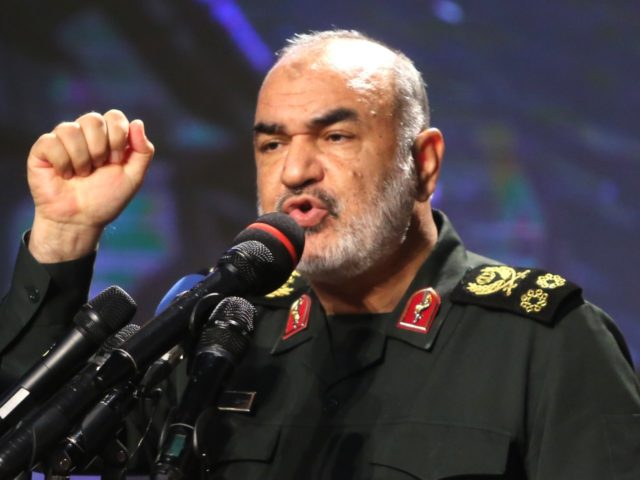Major General Hossein Salami, the head of Iran’s Islamic Revolutionary Guard Corps (IRGC), declared in remarks Thursday that Iran is “engaged in biological warfare” and will “win the war” against the Chinese coronavirus spreading worldwide.
The IRGC is a U.S.-designated terrorist organization and an official wing of the Iranian military, making it unique among terrorist entities. Its operations abroad have suffered greatly in the past two months as a result of a U.S. airstrike eliminating the head of the IRGC’s Quds Force, Major General Qasem Soleimani, while active in organizing deadly attacks on Americans in Iraq.
Iran has been among the hardest-hit countries fighting the Chinese coronavirus, which originated in Wuhan in December. It took China over a month to notify the world that it had identified an outbreak of a contagious disease, which it did on January 20 despite privately notifying the World Health Organization (WHO) at the beginning of the month.
At press time, Iranian officials have not made public if they know how the coronavirus entered the country or if they have identified the first carrier of the disease in Iran.
“Today, we are involved in biological warfare, but the country is resisting,” Salami, the IRGC chief, said on Thursday, according to Iran’s Tasnim News Agency. “The enemy is still focusing on economic pressure and psychological operation (against Iran) and uses every opportunity to toughen the conditions for our people. The enemy is seeking to shape the regional developments in its own favor.”
The report did not note if Salami identified “the enemy.” Typically, when Iranian officials use such vague terms, they are referring to the United States and Israel.
Tasnim also did not site Salami mentioning the Chinese coronavirus by name, instead hinting at a “difficult situation” currently and insisting that Iran “will never lose a war,” but not specifying if the war is against an alleged biological attacker or a metaphorical one against the virus itself. Salami’s comments closely follow remarks by other military leaders, however, suggesting that the coronavirus outbreak is the product of a deliberate biological attack on China and Iran.
“A study of the consequences of the virus in terms of tolls or the extent of the epidemic and the type of media propaganda over this issue that is aimed at increasing fear and panic among people strengthens the speculations that a biological attack has been launched against China and Iran with economic goals,” Brigadier General Gholam Reza Jalali, the head of the country’s Civil Defense Organization, told the state Fars News Agency on Tuesday.
Jalali also failed to name a culprit in his alleged “biological attack” and did not go as far as Salami in that he allowed for the fact that any conclusive evidence that the Chinese coronavirus is a biological weapon would require “laboratorial investigations.”
Coronavirus conspiracy theories have yet to reach Supreme Leader Ayatollah Ali Khamenei, but the use of bellicose language in the struggle to contain the virus has made itself present. In remarks Tuesday, Khamenei referred to the operation to contain the virus as a “jihad.”
“I feel it is my duty to once again thank these dear ones who are doing Jihad for the sake of God with their invaluable efforts,” Khamenei said. “I ask God to bring health to the sick, to grant His mercy on the deceased, and to bestow patience and tranquillity on their survivors.”
Khamenei also went out of his way to claim the outbreak, which has infected dozens of Iranian government officials and spread to nearly every province, would not cause significant damage.
“The Coronavirus is not such a big tragedy and this country has surmounted graver ones,” Khamenei claimed, in remarks some translated as “not a big deal.”
“I don’t want to say it’s unimportant, but let’s not exaggerate it either. The Coronavirus will affect the country briefly & leave. But the experience it brings, and the actions of the people & the govt sectors, are like a public exercise that will remain as an achievement,” Khamenei insisted.
Iranian officials claim that, as of Wednesday, they have confirmed 2,922 cases nationwide and documented 92 people dying as a result of coronavirus infections. The virus typically causes fever, shortness of breath, and other flu-like symptoms, and triggers pneumonia and death in older and medically compromised people. In others, it can cause no symptoms at all, which makes identifying coronavirus carriers particularly difficult.
Iranian dissidents and opposition groups have called into question the official numbers, noting the difficulty of diagnosing the case, evidence from Iranian hospitals, and the fact that Iran is using “homemade” coronavirus testing kits not distributed through the WHO. The People’s Mojahedin Organization of Iran (PMOI/MEK), Iran’s most prominent opposition organization, has published daily updates of the number of coronavirus cases its sources on the ground have been able to confirm. As of Thursday, PMOI has documented thousands of cases and 1,300 deaths nationwide, a much larger number than what Tehran has admitted to.
“Even the regime’s iconic Friday prayer congregations, and other events and gatherings, along with schools, universities, conferences, and meetings have been cancelled until further notice,” the PMOI noted.
Iran has confirmed several high-ranking officials have tested positive for coronavirus, including a senior Khamenei adviser who died this week, the head of coronavirus response in the country, and the vice president. In Parliament, 23 lawmakers have tested positive for the virus, several of whom have accused the regime of hiding the true extent of the outbreak.
The WHO praised Iran on Wednesday during a visit with senior leaders in Tehran.
“This is my second trip to Iran and according to my experiences, Iran is strong in managing crisis,” WHO Regional Director for the Eastern Mediterranean Richard Bernan said, according to Iran’s Fars News Agency. “Iranian managers are paying a specific attention to curbing the virus.”

COMMENTS
Please let us know if you're having issues with commenting.